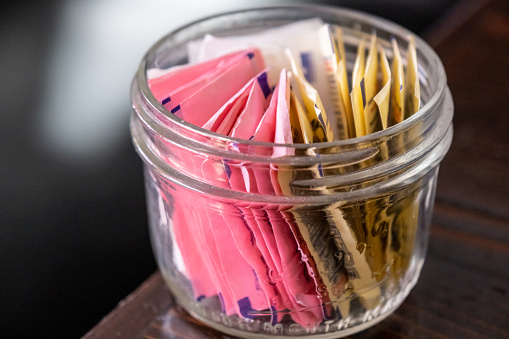
Are you aiming to decrease your sugar intake? You may be tempted to turn to artificial sweeteners as your option of choice. They are sweet, low or no calories at all and are sugar free. These traits make an irresistible offer for your cabinet or refrigerator, but there’s more to artificial sweeteners than you’ve probably been told.
Artificial sweeteners, also known as synthetic sugar substitutes, are much sweeter than regular refined sugar. They may be derived from natural herbs or sugar itself, and are used in a variety of products that we use every day. Although artificial sweeteners have been touted for their ability to help you manage weight-loss and diabetes, there’s another side of the story that can be detrimental to your health. Here are some things you should know about artificial sweeteners before adding them to your grocery list.
The debate over artificial sweeteners
Some researchers aren’t buying into all of the hype swirling around artificial sweeteners. They believe that these products only make you hungrier, since the sweet stuff confuses the brain and fails to activate the food reward pathway needed to make you feel full. However, recent studies don’t support this claim.
While there’s much debate over whether artificial sweeteners can cause cancer, negative gut health and unhealthy blood sugar numbers, there seems to be a consensus among many: It may deceive the mind. Research shows that these alternative sweeteners may hinder our ability to associate sweetness with calorie consumption, leading to higher sweet cravings that can increase weight gain over time. But, if you try to eliminate artificial sweeteners overnight, you may run into some resistance. Animal studies have shown artificial sweeteners to be addictive.
Watch out for these artificial sweeteners
It can be tempting to run straight to artificial sweeteners to curb your sugar cravings. Nonetheless, your body may not respond to this well–especially if you increase your intake of them just because you believe it’s healthier. Before purchasing artificial sweeteners, read the labels carefully to better understand what you are putting into your body.
Here are some of the most in-demand artificial sweeteners on the shelves today:
- Acesulfame potassium
- Alitame
- Cyclamate
- Dulcin
- Equal
- NutraSweet
- Nutrinova
- Splenda
- Sorbitol
- Sucralose
- Sweet ‘N Low
Remember, the most popular options aren’t always the best for you. If you notice any of these words buried in the fine print of food or drink labels, proceed with caution. What works for one person may not work for the next. Understand your body, know your needs and don’t over consume to avoid the dangers that can come with artificial sweeteners.
It’s not easy to escape
Although you may cross artificial sweeteners off of your grocery list after reviewing the labels, that doesn’t mean you’ll be able to easily avoid consuming products that contain it. You’ll find artificial sweeteners included in the most surprising products—many of which you consume every day.
Start going through your house to determine if artificial sweeteners are found in any of the below items:
- Alcoholic drinks
- Baked goods
- Bread
- Breakfast cereals
- Candy
- Canned fruit
- Chewing gum
- Children’s vitamins
- Cough syrup
- Dairy products
- Diet sodas
- Flavored waters
- Jams
- Juice drinks
- Mouthwash
- Puddings
- Salad dressings
- Sports drinks
- Toothpaste
- Yogurt
This list may be shocking, but it’s eye-opening and can help you make better decisions as well. Foods such as dried fruit and oatmeal contain sucralose—an artificial sweetener that is 600 times sweeter than table sugar. So, do your research and determine how the various artificial sweeteners can impact your health. All artificial sweeteners are not the same, but it’s good to know that some artificial sweeteners such as acesulfame, aspartame, neotame, saccharin and sucralose have been approved by the FDA.
Aim for natural sweeteners
Here’s one lesson you can learn from artificial sweeteners: Alternatives aren’t always nutritional. Sometimes, they are just a tool to satisfy our cravings. When in doubt, you can always opt in for natural flavors. Fresh or frozen fruit is a natural sweetener void of any empty calories. You can also enjoy maple syrup, agave and raw honey if you want to add a bit of sweetness to your meal. Adding more natural sweeteners to your diet instead of artificial sweeteners can work wonders for your health. Monitor your body, check in with your doctor and determine the best moves you can make to promote the best version of you!









